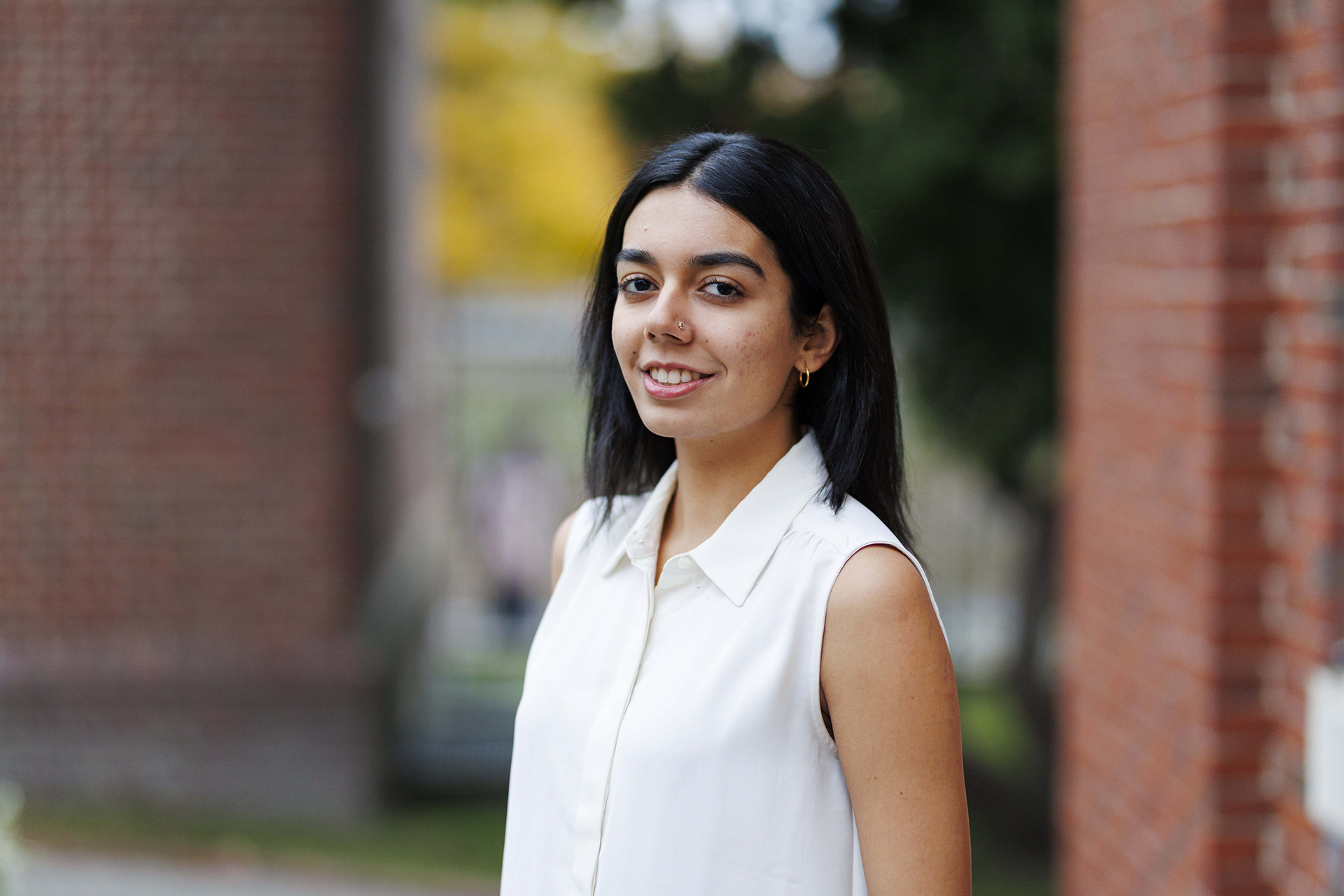
Niles Singer/Harvard Staff Photographer
‘Exploring everything’ leads to Rhodes
Fajr Khan to represent Pakistan, plans career in clinical psychology
Fajr Khan has learned the value of small things — giving somebody a meal, providing a safe place to sleep, or being fully engaged during a conversation with a lonely person.
Most her volunteer work with homeless people has been done quietly. But now the senior is trying to grasp a very different experience that is not so anonymous: winning a Rhodes Scholarship.
“It still hasn’t really settled in,” Khan said with a laugh. “It just feels very not real. There’s like this level of disbelief. But it’s very cool and exciting.”
Khan was chosen as one of two Rhodes Scholars representing Pakistan. She will spend two years at Oxford University, where she hopes to complete a master’s degree in clinical neuroscience, psychology, or psychiatry.
Afterward, she hopes to pursue a Ph.D. in clinical psychology and a career that combines research and working with patients.
“There’s a lot of stigma around mental health and a lot of misconceptions,” she said. “A lot of people consider it a rich man’s disease, but the data shows that people in vulnerable situations in poverty are some of the people with the most debilitating conditions and the ones who need mental health care. The fact that this Rhodes committee from Pakistan showed this commitment to taking mental health seriously is absolutely amazing — and very encouraging.”
“I think the biggest way that you can make an immediate, direct impact is through human connection, with human empathy.”
Khan calls herself a “classic international kid.” Born in Pakistan, she moved to Amsterdam as a toddler so her mother could begin a Ph.D. program in economics. The family remained in the Netherlands while her mother and father worked in the energy sector.
She attended international schools and grew up speaking English, Urdu, and Dutch. When she was 16, the family moved back to Pakistan, and she enrolled in an international school in Lahore.
At Harvard, she is studying neuroscience with a secondary in philosophy — and many forays into other subjects, such the history of science, creative writing, lyric poetry, and global health.
“If you look at my transcript, you would not be able to tell what my concentration was until my third year,” she said with a chuckle. “Probably because I was very much one of those ‘explore everything!’ people.”
Khan is particularly interested in public health. In 2024, she did a summer internship with Gavi, The Vaccine Alliance in Geneva, Switzerland. Last January, she started working as a research assistant at a clinic for mothers with postpartum traumatic stress disorders at Massachusetts General Hospital.
She has been active in the Phillips Brooks House Association and volunteering at the Harvard Square Homeless Shelter, a student-run operation in the basement of University Lutheran Church. She has served meals, cleaned bathrooms, and worked directly with clients alongside a case manager.
Later she became a supervisor for overnight shifts. Now she serves as the shelter’s policy director.
“A lot of the time, issues can feel so big and all-encompassing, and it can be difficult trying to figure out where to start,” she said. “I think the biggest way that you can make an immediate, direct impact is through human connection, with human empathy. I’ve grown up in so many different places — different languages, different cultures — and one-on-one, human connection is something that I remember the most.”
When Khan made the shortlist of Rhodes finalists, she flew home to Pakistan for two days of social events and interviews.
On the final day, the candidates were called into interviews, one by one. The selection committee deliberated briefly and emerged to announce the two winners. Typically, at least one — and sometimes both — attend universities in Pakistan, so Khan figured the odds were not in her favor.
“They came out with a piece of paper, and they called my name,” she said. “I was just in complete disbelief. I remember I got up from my chair, but then I was like, ‘Wait, I don’t even know why I’m standing!’”
Khan phoned her parents and told them she was done and ready to be picked up — but nothing about winning.
Her parents drove up in front of the grand house where the event was hosted.
“I came downstairs, opened the door, and sat in the car,” she recalled. “Then I said, ‘Guess who’s a Rhodes Scholar!’”





